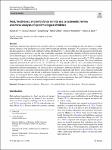Item Infomation
Full metadata record
| DC Field | Value | Language |
|---|---|---|
| dc.contributor.author | Xu, Zhiwei | - |
| dc.contributor.author | Watzek, Jessica T. | - |
| dc.contributor.author | Phung, Dung | - |
| dc.date.accessioned | 2023-08-14T08:26:01Z | - |
| dc.date.available | 2023-08-14T08:26:01Z | - |
| dc.date.issued | 2023 | - |
| dc.identifier.uri | https://link.springer.com/article/10.1007/s00484-023-02525-0 | - |
| dc.identifier.uri | https://dlib.phenikaa-uni.edu.vn/handle/PNK/8806 | - |
| dc.description | CC-BY | vi |
| dc.description.abstract | Ambulance data has been reported to be a sensitive indicator of health service use during hot days, but there is no comprehensive summary of the quantitative association between heat and ambulance dispatches. We conducted a systematic review and meta-analysis to retrieve and synthesise evidence published up to 31 August 2022 about the association between heat, prolonged heat (i.e. heatwaves), and the risk of ambulance dispatches. We initially identified 3628 peer-reviewed papers and included 48 papers which satisfied the inclusion criteria. The meta-analyses showed that, for each 5 °C increase in mean temperature, the risk of ambulance dispatches for all causes and for cardiovascular diseases increased by 7% (95% confidence interval (CI): 5%, 10%) and 2% (95% CI: 1%, 3%), respectively, but not for respiratory diseases. The risk of ambulance dispatches increased by 6% (95% CI: 4%, 7%), 7% (95% CI: 5%, 9%), and 18% (95% CI: 12%, 23%) under low-intensity, severe, and extreme heatwaves, respectively. | vi |
| dc.language.iso | en | vi |
| dc.publisher | Springer | vi |
| dc.subject | sensitive indicator | vi |
| dc.subject | Ambulance data | vi |
| dc.title | Heat, heatwaves, and ambulance service use: a systematic review and meta-analysis of epidemiological evidence | vi |
| dc.type | Book | vi |
| Appears in Collections | ||
| OER - Khoa học môi trường | ||
Files in This Item:

